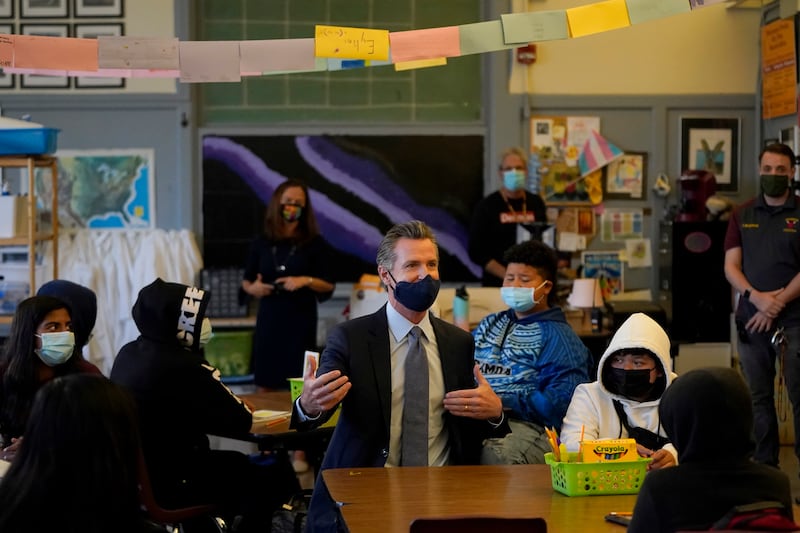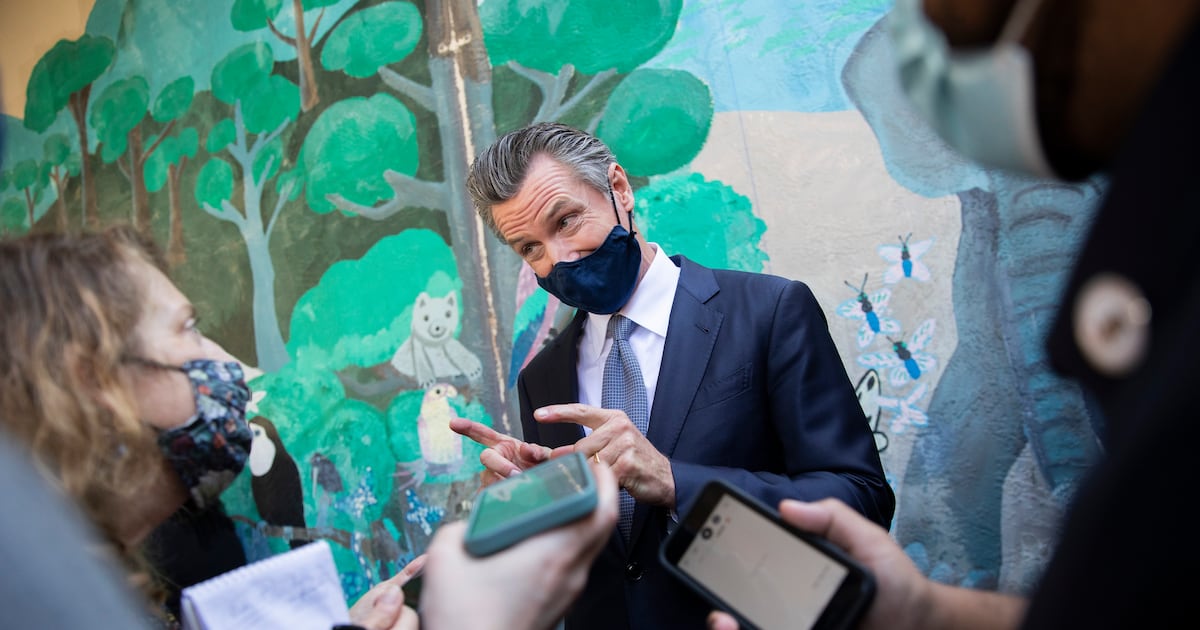This article was first published in the Right to the Point newsletter. Sign up to receive the newsletter in your inbox each week.
With 2028 nearer in the mirror than it seems, California Gov. Gavin Newsom is tilling the middle ground of America, hoping to get centrists to give him a look. And part of that strategy seems to be owning some of the more controversial moves he made as governor during the COVID-19 pandemic — whether he wants to or not.
Appearing recently on the Shawn Ryan podcast, Newsom was blindsided by a question sent in by Joe Rogan, who asked the governor, “Who will be held accountable for mandating COVID-19 vaccines for children, which were unnecessary and ineffective, and who will take responsibility for the unprecedented increases in myocarditis and cancer cases among them?”
That was a minefield for any politician to navigate, let alone a Democrat from California, which had one of the most aggressive responses to COVID-19, but there was more to come from Rogan:
“Second to that, do you feel any remorse for that draconian decision that was obviously heavily influenced by the pharmaceutical companies’ desire for maximum profit?”
In his answer, Newsom acknowledged that California was more restrictive and aggressive than other states “at scale,” and said everyone is a “genius now in hindsight.”
“But at the time, none of us knew what we were up against, including the president of the United States, who I worked very closely with.”
Newsom went on to say of Donald Trump, “And I say that with the kind of humility he deserves as well — grace that he deserves in terms of the decisions he made early on. We were all up against something none of us had any experience on.”
To be fair, this isn’t a pivot for the governor. Newsom has been owning mistakes since 2021, when he survived a recall election. In 2023, he said on “Meet the Press” that knowing what we know now, “We would’ve done everything differently.”
But the tough line of questioning five years out from the first year of COVID-19 shows that the pandemic has a very long tail when it comes to politics.
 FILE — In this Oct. 1, 2021 file photo Gov. Gavin Newsom, middle, speaks to students in a seventh grade science class at James Denman Middle School in San Francisco. California schools have a few statewide requirements for how schools apply COVID rules for schools but leave most details up to the local districts, leading to a dizzying patchwork of approaches that parents and teachers say can be confusing and frustrating. | Jeff Chiu, Associated Press
FILE — In this Oct. 1, 2021 file photo Gov. Gavin Newsom, middle, speaks to students in a seventh grade science class at James Denman Middle School in San Francisco. California schools have a few statewide requirements for how schools apply COVID rules for schools but leave most details up to the local districts, leading to a dizzying patchwork of approaches that parents and teachers say can be confusing and frustrating. | Jeff Chiu, Associated Press He is facing it head-on with a report he commissioned that will address both what California did right and wrong during the pandemic — a report based in part on critics of the administration’s actions.
“With humility and grace, I’ve asked them to have that report. It’s the only report that I know of that’s putting out a truly objective review of what went right and what went wrong,” Newsom told Ryan.
That may be an overstatement — medical experts have been doing their own COVID reckoning, trying to figure out why the U.S. did so “catastrophically poorly” — as one Duke University health expert put it — in its pandemic response compared to our peer nations. And California’s report, expected to land in the next few weeks, may not shed any new light on the subject.
Newsom’s “humility and grace” response could well be driven by presidential ambition and a PR firm, but it’s still nice to hear that kind of language in any political space.
Ryan rising
Shawn Ryan, the former Navy SEAL who had Newsom on his show for a conversation that lasted an astonishing four hours, did not make Time magazine’s recent list of the “the most innovative, influential, and informative” podcasts “in the history of the medium.”
More significantly, neither did Rogan, whose support of Donald Trump, announced on the eve of the 2024 election, also has a long tail — some liberals who used to like him now don’t even though Rogan has been sharply critical of Trump this year on issues such as immigration and the president’s handling of the Jeffrey Epstein case.
There wasn’t a single conservative or “contrarian” podcast thrown in the list, conservatives complained, which is surprising given the current conversation about how the media is “capitulating” to Trump.
But Ryan remains someone to watch in the podcast space. His show focuses on “sharing uncensored first-person stories from military veterans, law enforcement officers, and others in high-stakes careers,” per Business Insider, and his increasing popularity has caught the critical eye of Mother Jones, the progressive magazine that has called him “MAGA’s favorite military influencer.”
Mother Jones describes Ryan’s content as blending “the deeply confessional with the darkly conspiratorial,” but it’s significant that Newsom considered the show worth his time, as have Dr. Ben Carson and Dave Ramsey. And he revealed a certain marketing genius by opening his show with Newsom by giving him a gun — the governor’s first.
“This is fabulous. The last thing people would expect is that I respect this gift,” Newsom said.
Whether becoming a first-time gun owner at the age of 57 is something Ryan’s core audience will appreciate remains to be seen. But the lengthy conversations unfolding on podcasts like Ryan’s are apparently now a requirement for anyone seeking to hold public office. We’re going to need a longer attention span.
Recommended reading
Everything you need to know about the national debt and why it matters is here in Jay Evensen’s comprehensive explainer.
He writes: “The national debt, and the $2 trillion annual budget deficit that feeds it, may seem hopeless. It’s easy to understand why many Americans choose to ignore the problem, especially in times of relative plenty (inflation worries aside). But the problem can be simplified if it’s reduced to what experts say would be the source of the economy’s eventual undoing — the loss of confidence among investors who buy Treasury instruments.”
When will the national debt become a priority?
Naomi Schaefer Riley takes on the prevailing narrative that “the system” works against women and that they are destined for misery.
She writes: “Part of growing up is realizing that we have autonomy, that our life outcomes are not just a product of structural forces acting on us. In reality, women have a lot of choices open to them, but there are only a few that will genuinely make them happy.”
Why are we telling women that motherhood will make them miserable?
Similarly, Meagan Kohler questions why women’s wellbeing is “evaluated only through economic and political lenses.”
“In fact, research suggests that having fewer women than men actually in the workforce reflects better the preferences of many women, because most women want to participate more directly in family life in addition to work and career. As a result, flexible and part-time arrangements are more attractive to them, even if it results in lower GDP.”
High levels of homemaking isn’t a sign of inequality
Endnotes
Just when we thought the Coldplay scandal was over, Astronomer, the company that employed the two people caught on the infamous kiss cam, came out with an ad that is being hailed as ingenious.
The ad features Gwyneth Paltrow, who used to be married to Coldplay’s Chris Martin (and who is the source of endless publicity for Utah, because of the skiing accident she was involved in and the successful musical made about it). In it, she explains the sort of work the company does, which ordinarily wouldn’t capture the public’s imagination quite like the story has.
And with that, I’ll leave you with my own astronomer story, completely unrelated to the Coldplay story, but directly related to another kind of star:
Meet ‘the pope’s astronomer’ — an MIT-educated American who believes science needs religion
As always, thank you for reading and being part of the Right to the Point community. You can email me at Jgraham@deseretnews.com, or send me a DM on X, where I’m @grahamtoday.
